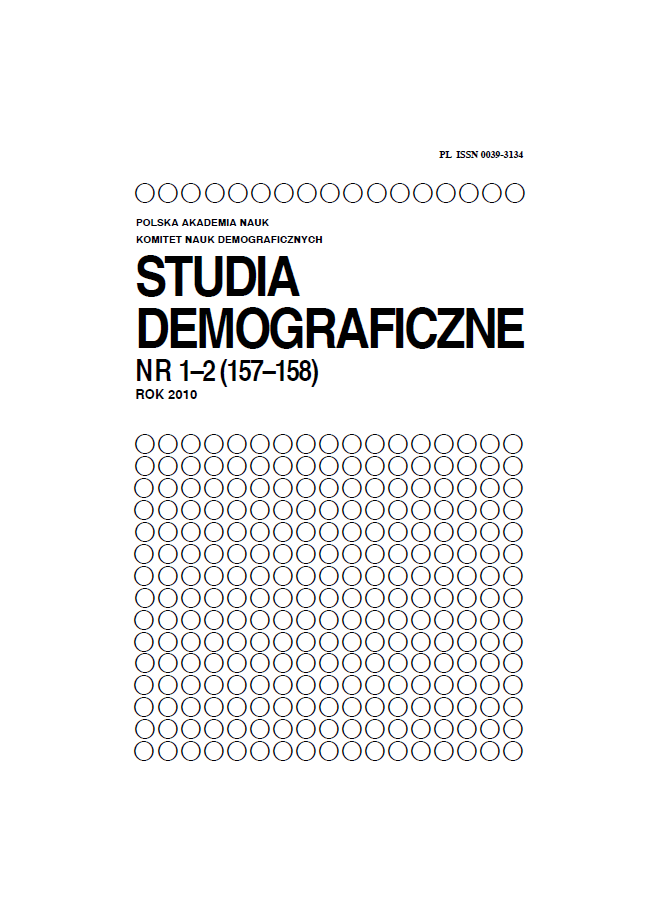Kapitał społeczny w Polsce w świetle Diagnozy Społecznej – pomiar i wyniki
Main Article Content
Abstract
The aim of the article is to present an approach to measuring social capital, and the results of its application in the context of contemporary Poland. Since the notion and the methods of measurement of social capital has not been defi nitely established yet, this paper tries to adapt the approach proposed by Van Oorschot, Arts and Gelissen (2006). Firstly, their conceptual model of social capital is discussed. Secondly, it is verifi ed whether the Social Diagnosis survey is a good source of indicators of social capital. Thirdly, the measurement models for various dimensions of social capital (networks, trust and norms) are discussed and estimated based on the Social Diagnosis data. Finally, on the basis of the estimates, changes in the dimensions of social capital between 2005 and 2009 are assessed.
It is worth underlining that the results obtained are the consequence of the choice of data source and the proposed approach to operationalisation. Nevertheless, the results show that the dimensions of social capital can be operationalised and quantifi ed following the modifi ed approach proposed by Van Oorschot, Arts and Gelissen (2006) and using data from the Social Diagnosis survey. They are justifi ed by the fi t statistics of models estimated for each wave separately as well as of the multigroup model (for all three waves together), expected sign of factor loadings and signifi cance of most indicators.
Article Details
References
[2] Bourdieu P., 1983, Ökonomisches Kapital, kulturelles Kapital, soziales Kapital [The
Forms of Capital], [w:] R. Kreckel (red.), Soziale Ungleichheiten (Soziale Welt, Sonderheft 2) (183-98), Otto Schartz & Co, Goettingen. Artykuł przetłumaczony na język angielski przez Richarda Nice’a i dostępny na stronie: http://www.viet-studies.org/Bourdieu_capital.htm,, stan na dzień 17.09.2006.
[3] Brown T. A., 2006, Confi rmatory Factor Analysis for Applied Research, The Guilford Press, New York, London.
[4] Browne M. W., Cudeck, R., 1993, Alternative ways of assessing model fi t, [w:] Bollen K. A., Long, J. S. (red.), Testing Structural Equation Models, 136–162, Beverly Hills, Sage.
[5] Coleman J. S., 1994, Foundations for Social Theory, The Belknap Press of Harvard University Press, London.
[6] Czapiński J., 2006, Polska – państwo bez społeczeństwa, „Nauka”, 1/2006: 7 – 26.
[7] Czapiński J., Panek T. (red.), 2009. Diagnoza społeczna 2009, http://www.diagnoza.com, data pobrania: 11.03.2010.
[8] Davidov E., 2008, A Cross-Country and Cross-Time Comparison of the Human Values Measurements with the Second Round of the European Social Survey, „Survey Research Methods”, Vol. 2 , No.1: 33-46.
[9] Fukuyama F., 2000, Social capital and civil society, International Monetary Fund, Washington, D.C.
[10] Grootaert Ch., 1998, Social Capital: The Missing Link?, Social Capital Initiative Working Paper No. 3, The World Bank.
[11] Growiec J., Growiec K., 2009, Social Capital, Trust, and Multiple Equilibria in Economic Performance, IBS WORKING PAPER #02/2009, http://mpra.ub.uni-muenchen.de/19518/1/Model_v2.3_IBS.pdf , stan na dzień 27.04.2011
[12] Kaplan D., 2009, Structural equation modeling. Foundation and Extensions, Sage, Los Angeles.
[13] North D. C., 1990, Institutions, Institutional Change, and Economic Performance, Cambridge University Press, New York.
[14] OECD, 2001. The Well-being of Nations. The role of human and social capital, http://www.oecd.org/fi ndDocument/0,2350,en_2649_34543_1_1_1_1_1,00.html, (data dostępu: 20.01.2007).
[15] Putnam R., 1995, Demokracja w działaniu. Tradycje obywatelskie we współczesnych Włoszech, Wydawnictwo Znak, Kraków.
[16] Putnam R., 2001, Social Capital: Measurement and Consequences, [w:] The Contribution of Human and Social Capital to Sustained Economic Growth and Well-Being, International Symposium Report edited by the OECD and HRDC.
[17] Steenkamp J-B., Baumgartner H.,1998, Assessing Measurement Invariance in Cross-National Consumer Research, „The Journal of Consumer Research”, Vol. 25, No. 1: 78-90.
[18] Van der Veld W. M., 2009, Methodological Aspects of the Cross-National Evaluation of a Theory on the Causes of Generalized Social Trust, QMSS2 seminar at Bolzano-Bozen, Italy, June 11-12, 2009.
[19] Van Oorschot W., Arts W., Gelissen J., 2006, Social Capital in Europe. Measurement and Social and Regional Distribution of a Multifaceted Phenomenon, „Acta Sociologica”, Vol. 49(2): 149-167.
[20] Woolcock M., 1998, Social Capital and Economic Development: Toward a Theoretical Synthesis and Policy Framework, „Theory and Society”, Vol. 27, No. 2: 151-208.
